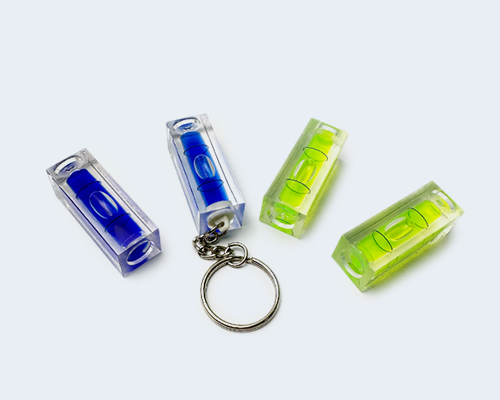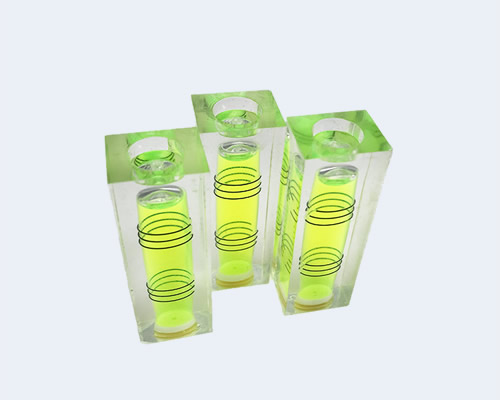Acrylic square block vials are spirit levels housed in a square acrylic casing, used to verify if a surface is horizontal or vertical. The sensitivity of these spirit levels and bubble vials is crucial, as it significantly impacts their accuracy.
Sensitivity in Acrylic Square Block Vials:
Sensitivity in the context of acrylic square block vials refers to the responsiveness of the bubble to changes in inclination. Specifically, it denotes how much inclination is needed to move the bubble a set distance within the vial.


Factors Affecting Sensitivity:
- Vial Curvature: The internal curvature of the vial determines the movement of the bubble. A steeper curve will result in higher sensitivity.
- Liquid Viscosity: The liquid inside the vial plays a role. A less viscous fluid allows the bubble to move more freely, making the vial more sensitive.
- Bubble Size: Larger bubbles can move more quickly and are easier to read, but might not offer the same precision as smaller bubbles.
- Vial Length: Longer vials can offer more precise readings as there is a larger distance for the bubble to travel.
Common Sensitivity Ratings: - Sensitivity is usually measured in arc minutes or millimeters per meter (mm/m). For example, a vial with a sensitivity of 30 arc minutes will have the bubble move 2mm (typically the distance between two graduation marks) when tilted by 30 arc minutes.https://www.spiritlevelvial.com
Features and Benefits:
- Material: Made of acrylic, they are clear and durable, providing a reliable view of the bubble.
- Design: The square shape allows for easy placement and can often be mounted or integrated into tools or machinery.
- Versatility: Suitable for various applications, from carpentry and construction to laboratory equipment and more.
- Durability: Acrylic is resistant to breakage and can withstand rough handling better than glass.
- Cost-Effective: Typically more affordable than glass vials, yet offer comparable performance.
Common Uses:
- These vials can be found in leveling tools, equipment setups, and other scenarios where ensuring a surface’s levelness is essential. Their square design often makes them a preferred choice for applications where they need to be mounted or embedded into square or rectangular spaces.
- Choosing the right sensitivity is crucial based on the intended application. For tasks requiring high precision, a more sensitive vial is ideal. Conversely, for general applications, a standard sensitivity might suffice.

 Click enlarge Image
Click enlarge Image

